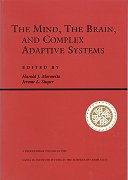This is a volume of thoughtful essays by a group of scientific leaders from physics,
cognitive psychology, cognitive science, the philosophy of science, artificial intelligence, and brain physiology.
It addresses fundamental issues such as, in the words of one of the contributors (Nobel Prize-winner
Herbert A. Simon), “How a mind resides in a brain.”
The essays are set in the framework of the evolving scientific concept of complex adaptive systems,
the basis for which is laid in an impressive essay by another Nobelist, physicist Murray Gell-Mann.
The various chapters include studies of the neurobiology of mental representation,
the brain architecture that bears on the organization of human memory,
a connectionist approach to emotions and neuro-modulation,
the possible neurobiological bases of consciousness,
the new scientific understanding of human unconscious processes,
and even the possibility of formulating a parallel distributed process
computer simulation of daydreaming and nightdreaming.
Scientists in the fields of brain biology, artificial intelligence, and psychology,
as well as educators interested in the links of mind and brain,
will find stimulating material for potential research and teaching in each chapter.
Contents
- • Murray Gell-Mann. Complex Adaptive Systems. 1994
- CASs perceive and respond to patterns: responding to patterns that are not actually there is "superstition", refusing to recognise patterns that are real is "denial" • Compression of perceived regularities, not just look-up tables • External fitness imposed by humans in the loop, versus internal emergent fitness where it is harder to define what is fit without being circular • Maladaptive: frozen accidents, mismatched timescales, ... • Hierarchies of CASs, higher level CASs composed of coevolving CASs
- • Jerome L. Singer. Mental Processes and Brain Architecture: Confronting the Complex Adaptive Systems of Human Thought (An Overview). 1995
- • Herbert A. Simon. Near Decomposability and Complexity: How A Mind Resides in a Brain. 1995
- • John Henry Holland. Can There Be A Unified Theory of Complex Adaptive Systems?. 1995
- • Patricia S. Goldman-Rakic. Neurobiology of Mental Representation. 1995
- • Larry R. Squire, Barbara J. Knowlton. The Organization of Memory. 1995
- • Patricia Smith Churchland. Can Neurobiology Teach us Anything About Consciousness?. 1995
- • John F. Kihlstrom. The Rediscovery of the Unconscious. 1995
- • David E. Rumelhart. Affects and Neuro-Modulation: A Connectionist Approach. 1995
- • John Antrobus. Thinking Away and Ahead. 1995
- • Roger C. Schank, John B. Cleave. Natural Learning, Natural Teaching: Changing Human Memory. 1995
- • Stevan Harnad. Does Mind Piggyback on Robotic and Symbolic Capacity?. 1995
- • Daniel C. Dennett. Evolution as An Algorithm--The Ultimate Insult?. 1995
